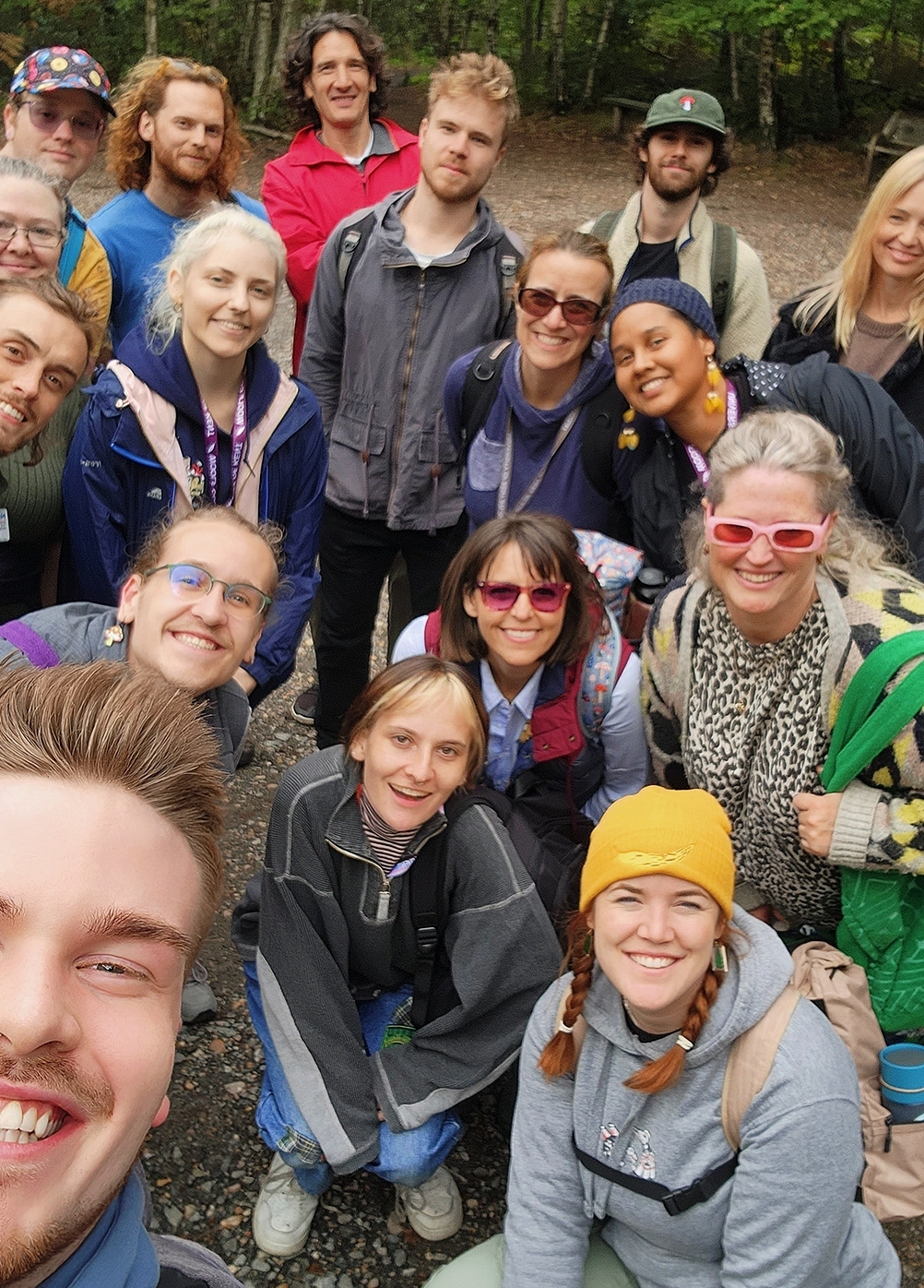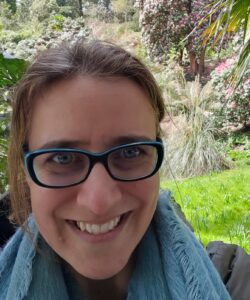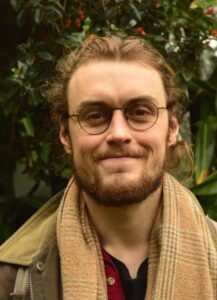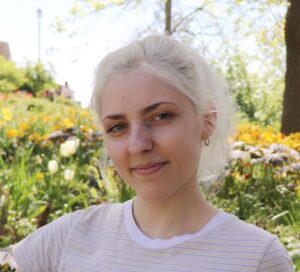
 Fiona Hafvenstein (2023) has recently been awarded a prestigious UK ESRC +3 doctoral scholarship, that will fund her PhD at Kent. Building on her current research for her Ethnobotany MSc on Artemesia species in Nepal, her project—Medicinal plants as a boundary mechanism: bridging the divide between traditional and biomedical health systems in Nepal with Artemisia annua—will explore Nepali engagement with such ‘crossover’ medicinal plants as “boundary objects”; she will ask whether they help bridge divides between biomedical and traditional medical knowledge systems in Nepal, increasing perceptions of mutual legitimacy, communication, and willingness to engage. For her MSc research, she’ll assess the presence of Artemesia species along a 140 km trek in Western Nepal, stopping to speak with residents about their knowledge and use of this important plant in their pharmacopeia.
Fiona Hafvenstein (2023) has recently been awarded a prestigious UK ESRC +3 doctoral scholarship, that will fund her PhD at Kent. Building on her current research for her Ethnobotany MSc on Artemesia species in Nepal, her project—Medicinal plants as a boundary mechanism: bridging the divide between traditional and biomedical health systems in Nepal with Artemisia annua—will explore Nepali engagement with such ‘crossover’ medicinal plants as “boundary objects”; she will ask whether they help bridge divides between biomedical and traditional medical knowledge systems in Nepal, increasing perceptions of mutual legitimacy, communication, and willingness to engage. For her MSc research, she’ll assess the presence of Artemesia species along a 140 km trek in Western Nepal, stopping to speak with residents about their knowledge and use of this important plant in their pharmacopeia.
 Sam Rees (2023) has won funding from the Global Diversity Foundation for the project Ethnobiological studies of green value chains for non-timber forest products in the Mbam et Djerem National Park, Cameroon. Working with the local community-based organisation, ABOYERD, this project will identify new forest products that can be utilised in green value chains to improve local livelihoods. They will document the uses, folk taxonomies, ecological value and concerns about sustainability and biocultural conservation for potential forest commodities. The funding comes through GDF’s Mentoring Global Environment Network Fellows to incubate Global South biodiversity-livelihoods projects, funded in part by a Darwin Initiative grant to build capacity for conservation. The CBCD and School of Anthropology and Conservation are fortunate partners, and Sam is our first winner of support for his project with GEN Fellow, Valery Binda Aghah, executive director of Agriculture and Bio-conservation Organization for Youth Empowerment and Rural Development (ABOYERD).
Sam Rees (2023) has won funding from the Global Diversity Foundation for the project Ethnobiological studies of green value chains for non-timber forest products in the Mbam et Djerem National Park, Cameroon. Working with the local community-based organisation, ABOYERD, this project will identify new forest products that can be utilised in green value chains to improve local livelihoods. They will document the uses, folk taxonomies, ecological value and concerns about sustainability and biocultural conservation for potential forest commodities. The funding comes through GDF’s Mentoring Global Environment Network Fellows to incubate Global South biodiversity-livelihoods projects, funded in part by a Darwin Initiative grant to build capacity for conservation. The CBCD and School of Anthropology and Conservation are fortunate partners, and Sam is our first winner of support for his project with GEN Fellow, Valery Binda Aghah, executive director of Agriculture and Bio-conservation Organization for Youth Empowerment and Rural Development (ABOYERD).
 Anne-Sophie Wiedenmayer (2023) will be traveling to the Amazon rainforest to conduct fieldwork at the Rio Amazonas Research Station in the Lower Yarapa River basin, Peru. For her project, Indigenous Peruvian Women Tell the Stories of the Rainforest: Reflection of Achuar Women’s Understandings of the Amazon Rainforest in Traditional Stories, she has been awarded a FUNDAMAZONIA Research Fellowship. Her aim is to contribute to the field of cultural transmission by exploring and analysing storytelling as a mode of cultural transmission among Achuar women. She’ll also be highlighting the often-neglected role of women and women’s knowledge in studies of ethnobotany and conservation science.
Anne-Sophie Wiedenmayer (2023) will be traveling to the Amazon rainforest to conduct fieldwork at the Rio Amazonas Research Station in the Lower Yarapa River basin, Peru. For her project, Indigenous Peruvian Women Tell the Stories of the Rainforest: Reflection of Achuar Women’s Understandings of the Amazon Rainforest in Traditional Stories, she has been awarded a FUNDAMAZONIA Research Fellowship. Her aim is to contribute to the field of cultural transmission by exploring and analysing storytelling as a mode of cultural transmission among Achuar women. She’ll also be highlighting the often-neglected role of women and women’s knowledge in studies of ethnobotany and conservation science.
 Kim Ubendran (2023) has won funding for her MSc research project entitled, Lost Ethnoveterinary practices in the UK: What British flora are UK farmers utilising to treat their livestock? Her Emily Holmes Memorial Scholarship Grant (from RBG Kew and Amar-Franses and Foster-Jenkins Trust) will allow her to travel through the UK, visiting farms and collecting information on current and past veterinary practices. Her aim is to better understand why farmers are choosing to continue using herbal remedies over allopathic drugs for the treatment of their livestock and/or companion animals, as well as how this knowledge is being learned and passed on.
Kim Ubendran (2023) has won funding for her MSc research project entitled, Lost Ethnoveterinary practices in the UK: What British flora are UK farmers utilising to treat their livestock? Her Emily Holmes Memorial Scholarship Grant (from RBG Kew and Amar-Franses and Foster-Jenkins Trust) will allow her to travel through the UK, visiting farms and collecting information on current and past veterinary practices. Her aim is to better understand why farmers are choosing to continue using herbal remedies over allopathic drugs for the treatment of their livestock and/or companion animals, as well as how this knowledge is being learned and passed on.
 Jason Irving(2018) is an ESRC funded PhD student. He has recently been awarded two fellowships to pursue historical and archival aspects of his doctoral thesis. His research focuses on Jamaican medical ethnobotany, its deep history in Africa and colonial and post-colonial transformations at home and in new diasporic contexts such as London. Specifically, he focuses on Syphilis and sarsaparilla (from Smilax species) in Jamaica, and the trade of sarsaparilla to and from Jamaica, in the period of English plantation slavery. The first is the John Carter Brown Fellowship 2023-24 to conduct research among the collections and archives of the John Carter Brown Library at Brown University in the US. The JCB Library holds materials of great relevance to Jason’s thesis, including manuscripts on Jamaica specifically by physicians that worked there, botanical illustrations, correspondence from Jamaica, pro slavery and abolitionist reports on the conditions of slavery, and more generally, European manuscripts on venereal disease and materia medica. The second is the Royal Society’s Lisa Jardine Fellowship 2024, examining the role of the Royal Society itself in the history of scientific discovery of medicinal plants in Jamaica, beginning in the 17th century. The materials available in the Royal Society archives are of great relevance to Jason’s thesis, including manuscripts on Jamaica specifically by collectors, like Hans Sloane and James Petiver, whose networks in Jamaica and across the slave trade were important for collecting specimens of medicinal plants and knowledge about them from the island.
Jason Irving(2018) is an ESRC funded PhD student. He has recently been awarded two fellowships to pursue historical and archival aspects of his doctoral thesis. His research focuses on Jamaican medical ethnobotany, its deep history in Africa and colonial and post-colonial transformations at home and in new diasporic contexts such as London. Specifically, he focuses on Syphilis and sarsaparilla (from Smilax species) in Jamaica, and the trade of sarsaparilla to and from Jamaica, in the period of English plantation slavery. The first is the John Carter Brown Fellowship 2023-24 to conduct research among the collections and archives of the John Carter Brown Library at Brown University in the US. The JCB Library holds materials of great relevance to Jason’s thesis, including manuscripts on Jamaica specifically by physicians that worked there, botanical illustrations, correspondence from Jamaica, pro slavery and abolitionist reports on the conditions of slavery, and more generally, European manuscripts on venereal disease and materia medica. The second is the Royal Society’s Lisa Jardine Fellowship 2024, examining the role of the Royal Society itself in the history of scientific discovery of medicinal plants in Jamaica, beginning in the 17th century. The materials available in the Royal Society archives are of great relevance to Jason’s thesis, including manuscripts on Jamaica specifically by collectors, like Hans Sloane and James Petiver, whose networks in Jamaica and across the slave trade were important for collecting specimens of medicinal plants and knowledge about them from the island.
More information on Ethnobotany at Kent: Dr Rajindra Puri: rkp(at)kent.ac.uk